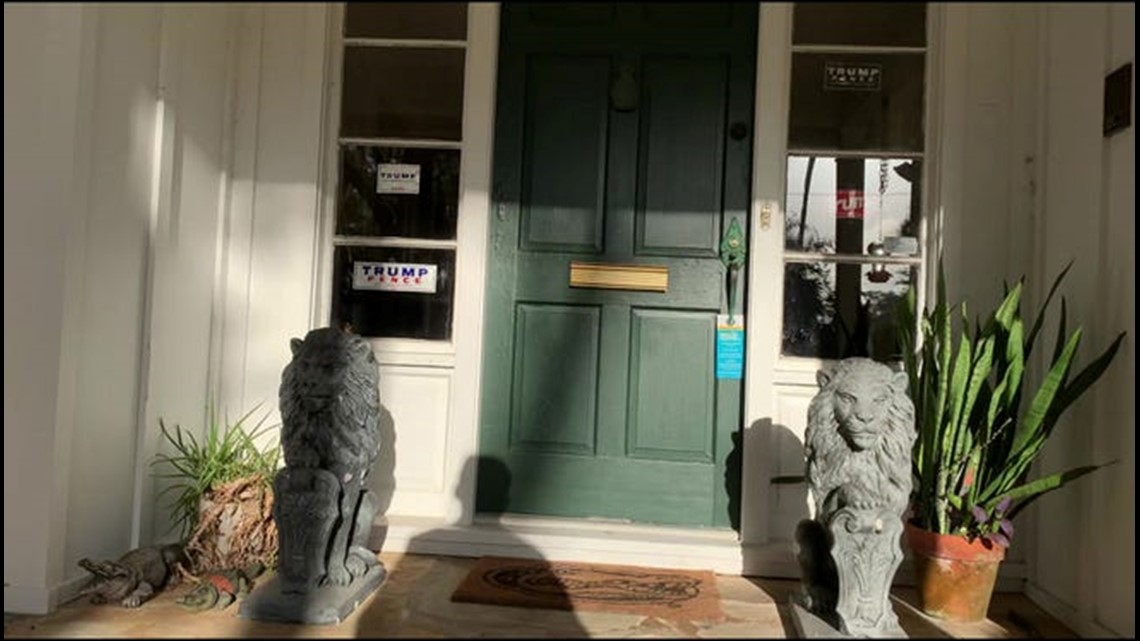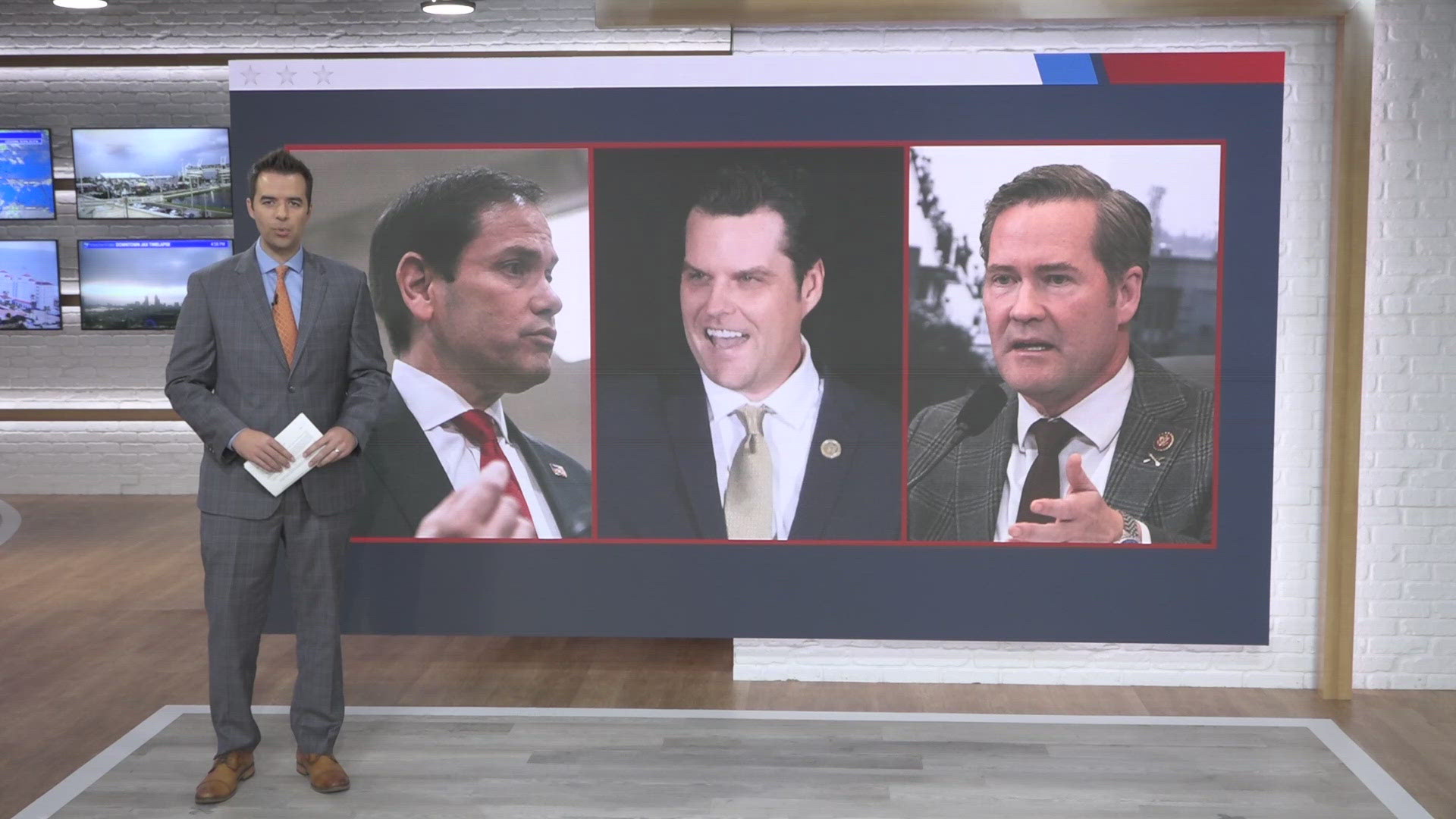DUVAL COUNTY, Fla. — RELATED: UPDATE: Duval County Canvassing Board chair resigns following President Trump donation, yard sign controversy
A local judge and head of Duval County’s vote-counting board has donated repeatedly to President Trump’s re-election campaign and other Republican efforts, and his home is covered in signs supporting Trump, despite rules requiring judges like him refrain from donations or public support.
Duval County senior Judge Brent Shore has served as chairman of the canvassing board because of his role as a county judge.
And canvassing board rules bar members from "displaying a candidate's campaign signs."
Senior county Judge Brent Shore, who has refused to change rules barring the public from photographing or videotaping vote-counting meetings, first donated $20 in 2016 to Donald Trump’s initial campaign for president. He has donated 11 more times since then to Trump for a total of $170, as well as donating $178 in the last two years to the Republican National Committee, the National Republican Congressional Committee and the National Republican Senatorial Committee.
Outside his home, his yard holds a Trump sign and two signs for Republican U.S. Rep. John Rutherford. A Trump-Pence banner hangs from his front window, and four stickers cover the window panels by his front door.
“Americans for the Trump Agenda,” reads one. “Keep the heat on Congress.”
Violating the judicial canons could land Shore, who wouldn't answer questions for this story, in front of the Judicial Qualifications Commission, where judges are prosecuted and even removed from their positions depending on the seriousness of their violations.
Shore also may have violated the rules for canvassing board members. Canvassing boards, which right now have been counting mail ballots prior to Election Day, are three-person boards with a county commissioner, an elections supervisor and led by a county judge. They are banned from “actively participating” in campaigns or supporting candidacies.
The Division of Elections has said while campaign donations don't count as active participation, “displaying a candidate's campaign signs” would disqualify someone from serving on a canvassing board.
If Shore doesn’t resign, another Division of Elections opinion said, removing him from the board “might ultimately require judicial resolution” through a lawsuit.
A Division of Elections spokesman didn't return a request for comment.
Wife 'not convinced' husband donated
While Shore didn’t return requests for comment, his wife, Kathryn Petway Shore, answered the door Wednesday evening at their Atlantic Beach home and demanded to know how a reporter knew her husband had donated to Trump.
She then said the Federal Elections Commission’s donor database must be wrong because her husband hadn’t donated to Trump.
“I’m not convinced just because somebody put it on a list that my husband did it,” she said. The donations said they came from a Brent Douglas Shore who listed their home address and said his occupation was “judge,” “judicial” and “retired” and listed the “state of Florida” as his employer.
She said the six signs and stickers supporting Trump’s campaign and the two signs for Rutherford belonged to her and not to her husband.
“My husband would never do anything unethical or improper,” she said. “I am not a judge, and those signs are mine. And yes, that’s my half of the front yard.”
She said the sign on the other half of the yard was also hers. Yet a judicial ethics opinion explicitly says spouses cannot post political signs in the yard in front of homes where judges live.
"The campaign sign in the yard of the residence jointly owned by the judge and spouse conveys to the public a message that the judge supports the candidate," the opinion said.
Kathryn Shore has donated $372 to Trump. Her donations were listed separately from her husband's.
Although a reporter for The Florida Times-Union told Kathryn Shore he would return later to speak to her husband, no one answered the door two hours later.
Duval’s Canvassing Board is Elections Supervisor Mike Hogan, City Councilman Michael Boylan and county Judge Gary Flower. Flower, however, has been absent since the board began correcting ballots last week, and in his stead, Shore has been leading the board.
Flower has not responded to emails or a voicemail this week.
Hogan said he had no comment because he didn’t know about Shore’s donations or the signs in Shore’s yard.
Chief Judge Mark Mahon, when asked if this was a violation of the judicial canons, said, “I am not an expert on judicial canons at all. You’d have to refer that — I don’t know to whom. I guess, maybe, the JQC [Judicial Qualifications Commission].” Mahon appointed Shore as the alternate to the Canvassing Board.
Given Shore’s status as a sitting judge, many lawyers said they wouldn’t comment for fear of provoking a negative response from him.
Hank Coxe, a former Florida Bar president who prosecutes for the Judicial Qualifications Commission, declined to comment. Coxe, a Jacksonville attorney, cannot prosecute judges in Duval, Clay or Nassau counties.
Rule prohibits judges' donations
Jacksonville Public Defender Charlie Cofer, who used to sit on the bench with Shore, only shared links to a judicial ethics opinion and the actual rule barring judges from making donations.
Duval County Judge Roberto Arias, a member of the Judicial Ethics Advisory Panel and a colleague on the bench, similarly said he couldn’t comment about a colleague to whom he may have to provide ethical advice, but he sent a link to an opinion that said even senior judges, who are partially retired but can still hear cases, are barred from donating to campaigns, even if it's their child's campaign and they aren't currently sitting on the bench.
If a judge wants to make donations, the opinion said, that judge must tell the Florida Supreme Court he or she doesn’t want to serve as a judge anymore, and that person must make sure to stop using the title “judge”.
Until then, “the retired judge may not engage in any activity that would involve endorsing a candidate for public office and may not make political contributions.”
If Shore did renounce his judgeship, he may be disqualified from serving as the acting chairman of the Duval County Canvassing Board. Florida law requires the head of the board be a county judge unless none are able to serve.
Shore, who has taken an at-times caustic reaction to the media and to lawyers for the Duval Democratic Party, also led the board during the 2000 election when some 26,000 Duval votes for president were thrown out.
Lately, Shore has drawn criticism for his handling of the board as it has banned the public and media from photographing or videotaping the proceedings, despite repeated rulings from Florida courts saying board meetings cannot bar non-disruptive photography or recordings.
Though the initial rules went into place by Flower, Shore, who has criticized media coverage, has refused to change the rules, saying if he allowed journalists to photograph that he would need to “babysit” them.
And when Democratic lawyers asked to see duplicated ballots that would be counted as votes, Shore said they were accusing him of lying since he was reading off the duplicated ballots to them. The issue, he said, was one of trust, even though the lawyers had a right to request the ballots.
Before Election Day, the Canvassing Board helps ensure mail ballots are getting counted.
When mail ballots are rejected by voting machine, staff sort the ballots into two piles: one with ballots that have voter-intent issues, and one with ballots that don’t have voter-intent issues.
The canvassing board reviews the voter-intent ballots, like ones where someone filled in multiple bubbles for the same race or used a checkmark instead of filling in a bubble, and a staffer fills out a new ballot with the board’s determinations. That ballot is then counted.
Even though he and the other board members agreed to live-stream parts of the meetings, the board is still not showing those remade ballots.
If a court rules the board has violated the state’s Sunshine Laws, then the court may invalidate all the vote-counting the board has done so far and force it to start over.
First Amendment lawyers say Shore’s refusal to allow photography risks delaying Florida’s election results.
While most of the ballots that come before the board are fairly easy determinations, some are much harder.
In one case, a voter filled in the bubble for Rutherford and filled in the bubble for Rutherford’s opponent, Democratic candidate Donna Deegan. The voter wrote something in bunched-up cursive next to the vote. To some in the audience, the writing appeared inscrutable.
The board, including Shore who has two signs for Rutherford in his yard, debated what to do before deciding to count the vote for Rutherford, rather than rule it an overvote.
“It’s not only the appearance of partisanship that leads to lack of confidence in the election system that we should be concerned about,” said University of Florida political scientist Dan Smith. “In Duval County, it’s also the lack of transparency.”
He continued, “People should expect more from people who are counting our votes.”
Chris Hand, a lawyer for the Duval Democrats, reiterated his support for lifting the board’s prior restraint on the media and the public.
In a statement, he said, “Every Florida county canvassing board member is a current or former elected official, and many have political affiliations. That is why the vote-counting process must be completely transparent. All citizens should be able to see democracy in action so they have confidence and trust in the final results. We hope the Duval County Canvassing Board will grant all of the requests the Democratic Party and media organizations have made for more transparency.”





